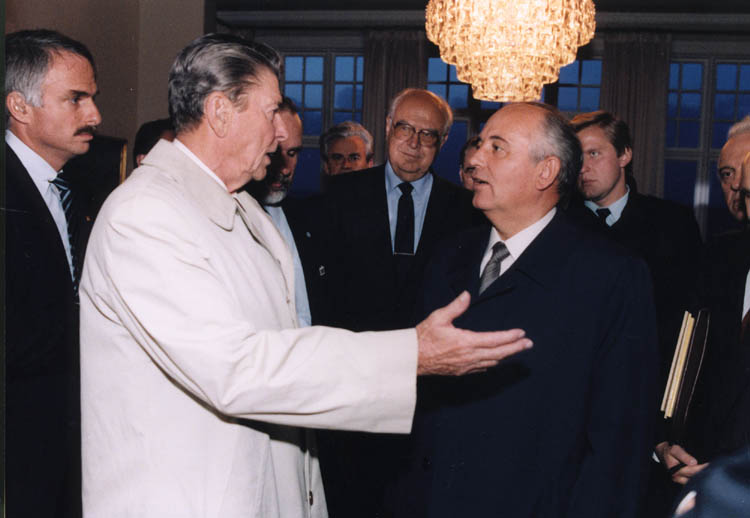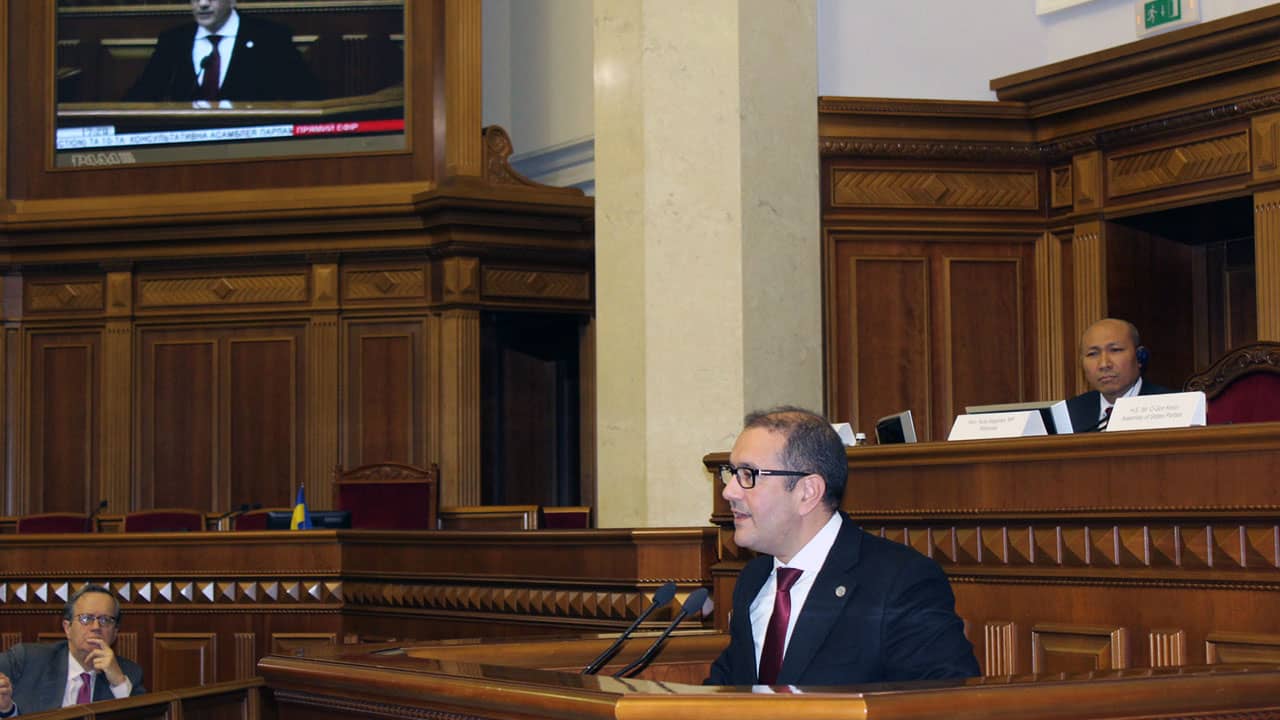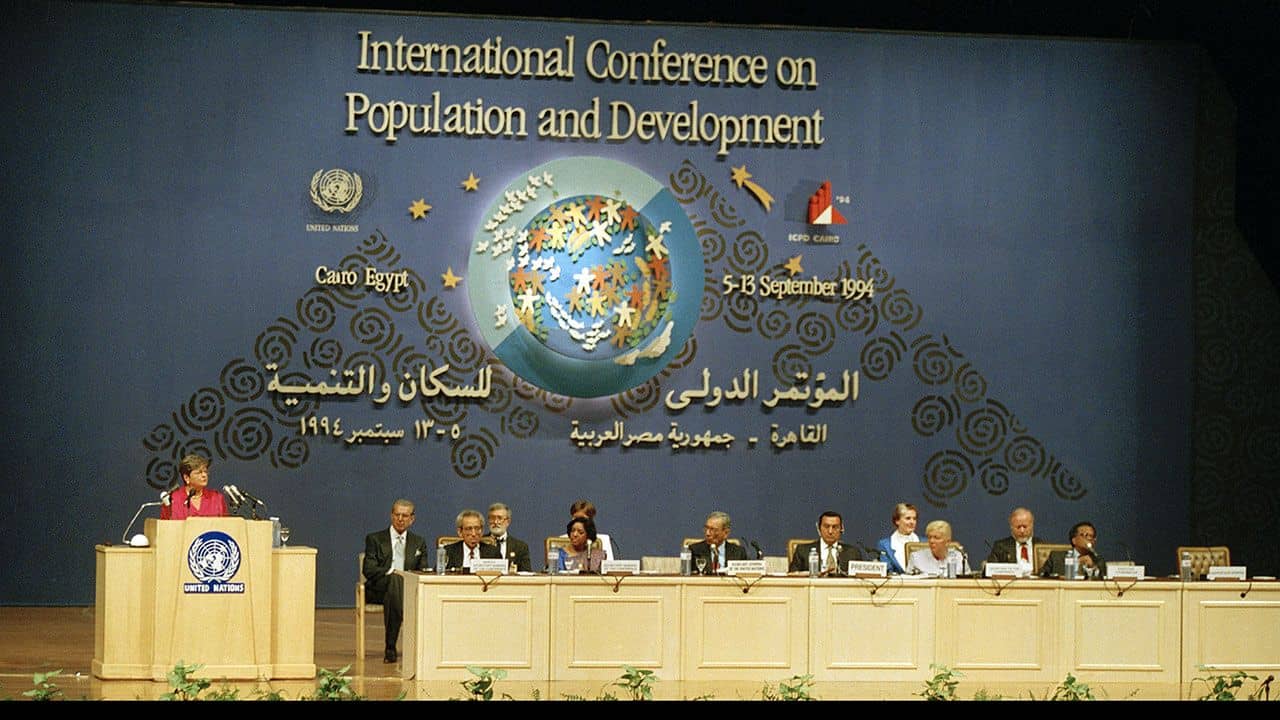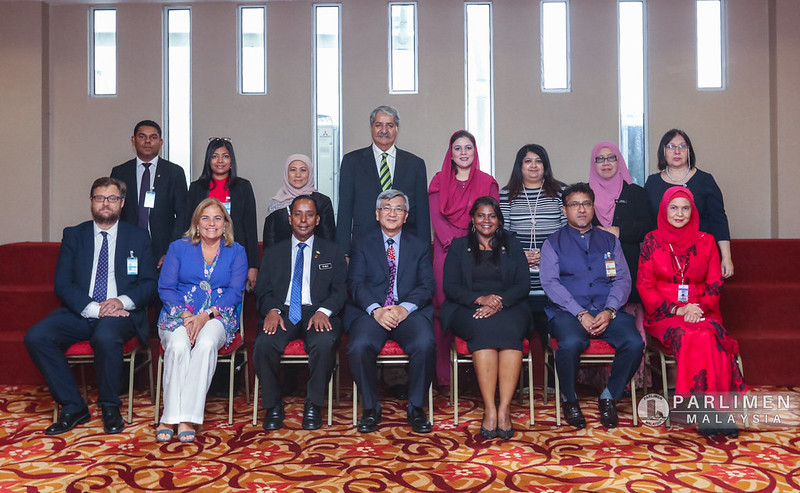
Parliamentarians for Global Action (PGA) was established in 1978 in Washington, D.C., by a group of concerned parliamentarians from around the world to take collective, coordinated and cohesive actions on global problems, which could not be successfully addressed by any one government or parliament acting alone. Founded during the Cold War era, an early focus and priority of the organization was the mobilization of parliamentarians worldwide in support of nuclear disarmament.
Achievements
Adoption of International Binding Treaties
PGA has acquired expertise over years of mobilizing its worldwide membership on successful campaigns in favor of international binding treaties such as the Comprehensive Test Ban Treaty (CTBC), the Chemical Weapons Convention (CWC), the Biological Weapons Convention (BWC), the Arms Trade Treaty (ATT), and the Rome Statute of the International Criminal Court (ICC).
Cold War: Disarmament & Peace Negotiations
1984: PGA was instrumental to the Five Continent/ Six Nation Peace Initiative, led by the Heads of States and Governments of Argentina, Greece, India, Mexico, Sweden and Tanzania. This initiative resulted in the adoption of the Comprehensive Nuclear-Test-Ban Treaty (CTBT) 12 years later.
1986: The first interactions between the US Congress and the Soviet Union Duma and Government took place, in part, through the initiatives of PGA members. The leaders were PGA member Sen. Tom Harkin [then US Congressman] and Mr. Olafur Grimmson [former President of Iceland] leading to the choice of Reykjavik for the historic Reagan-Gorbachev Summit meeting.

1986: PGA was awarded the first Indira Gandhi Peace Prize for the Six Nation Peace Initiative.
Non-Proliferation & Disarmament of WMDs
1992-1997: PGA played an important role in the genesis and evolution of the Convention on the Prohibition of the Development, Production, Stockpiling and Use of Chemical Weapons and on Their Destruction (CWC) and its members contributed to securing numerous ratifications of the CWC, facilitating its entry into force in 1997.
1995: A combined project between PGA, Greenpeace and the Government of New Zealand had a significant impact on halting French government nuclear testing in the Pacific.
2015: Launch of the Campaign for the Universality and Implementation of the Biological and Toxin Weapons Convention.
2019: PGA published a Parliamentary Handbook to Promote International Legislative Frameworks Addressing the Threats Posed by Weapons of Mass Destruction & Promotion of Bio-Risk Management Best Practices.
Regional Africa Workshop on Promoting the Role of Women Parliamentarians in Africa in Preventing the Proliferation of Weapons of Mass Destruction in May 2019 in National Assembly of The Gambia, Banjul
PGA members contributed to:
- The ratification of/accession to the Biological Weapons Convention (BWC) in 9 countries.
- The adoption of domestic legislation implementing the BWC in Chile and Dominican Republic.
- The submission of the first statement of confidence-building measures (CBM) regarding BWC in the Dominican Republic.
- The submission of the First National Report to the UNSC 1540 Committee by Guinea Bissau, Central African Republic, and the Solomon Islands. The Note Verbale from the Permanent Mission of Guinea-Bissau to the UN on this issue mentions PGA.
#MPsAgainstProliferation
— Parliamentarians for Global Action (@PGAction) September 23, 2019
We are delighted to have participated and made a presentation at the Regional #PacificIslands Workshop Promoting Universalization of #BWC.
The workshop was held in the @NZParliament, on 21 September 2019.
Our Campaign: https://t.co/eaBfNozhFW pic.twitter.com/1T6BSaF1D5
Illicit Trade in Small Arms & Light Weapons
2012: Over 2,000 MPs worldwide signed the Global Parliamentary Declaration for the Adoption of an Arms Trade Treaty (ATT).
PGA members made measurable contributions to:
- The ratification of the Economic Community of West African States (ECOWAS) Convention on Small Arms and Light Weapons in 3 countries.
- Decisively advancing the ATT ratification/accession process in 51 of the 110 UN Member States that have ratified/acceded to the ATT to date.
- Ensuring approval and passing of improved domestic firearms legislations in 2 countries.
International Criminal Justice
'90s: PGA members in Canada, Germany, Italy and the United States tabled resolutions in their parliaments and congresses on the adoption of an international criminal court with permanent jurisdiction. PGA member A.N.R. Robinson, MP (Trinidad & Tobago), in his capacity as Prime Minister, presented to the United Nations General Assembly a pivotal resolution that re-triggered the process of creation of a permanent international criminal jurisdiction.
These efforts contributed to the adoption of the Rome Statute of the International Criminal Court in 1998.

PGA members have played a key role in:
- The organization of PGA's biannual Consultative Assembly on the International Criminal Court and the Rule of Law (CAP-ICC), the only gathering of parliamentarians on this issue.

The 40th Annual PGA Forum and 10th Consultative Assembly of Parliamentarians on the International Criminal Court and the Rule of Law (CAP-ICC) within the Parliament of Ukraine (Kyiv), in November 2018 » - The ratification of/ accession to the Rome Statute of the ICC in 78 out of 125 countries having done so, of which 123 remain States Parties.
- The ratification of the Kampala Amendments in 6 countries.
- The adoption of domestic legislation implementing the Rome Statute in 37 countries. This includes the adoption of laws on cooperation with the ICC in Costa Rica and the Dominican Republic in 2019.
Dr Felipe Michelini, late and former PGA member, an outstanding leader in the fight against impunity for international crimes and Chair of the Board for the Trust Fund for the Victims (TFV) of the ICC, explains the importance of the Rome Statute system.
Abolition of the Death Penalty
PGA members contributed to reducing the scope of the death penalty, abolishing it altogether, blocking its reintroduction or the resumption of executions, or ratifying relevant international instruments in Malaysia, Uganda, and the Philippines. In the United States, PGA member Rep. Renny Cushing won a decades-long legislative battle to make New Hampshire the 21st US State to abolish the death penalty.
Rep Renny Cushing (United States) on why execution is no solution to survivors’ pain.
Similar initiatives were taken by PGA members in the Central African Republic, the Democratic Republic of Congo, India, and Kenya.
Read more: Hon. Dorcas Sibanda (Zimbabwe), on why the death penalty should be abolished in her country
Protection of the Oceans
22 November 2019: PGA and the Parliament of Cape Verde hosted the First International Parliamentary Oceans Day during PGA’s 41st Annual Forum.
Yes, I’m proud, indeed! #MPs4Oceans https://t.co/tnWD7kXtYw
— Petra Bayr global (@BayrPetra) November 22, 2019
Petra Bayr, MP (Austria) on the First International Parliamentary Oceans Day
PGA members have contributed to:
Posing parliamentary questions in 8 parliaments across the world.
The ratification of the Cape Town Agreement by São Tomé and Príncipe.
Sexual Orientation & Gender Identity
2017: PGA launched the publication“Advancing the Human Rights and Inclusion of LGBTI People: A Handbook for Parliamentarians”, in collaboration with UNDP.
PGA also created an LGBTI Inclusion Site, a resource hub for parliamentarians on equality and non-discrimination based on SOGI.
PGA’s workshop for parliamentarians on the end of discrimination based on SOGI in Latin America and the Caribbean hosted in Buenos Aires, Argentina, in May 2018.
Thanks to the PGA membership:
LGBTI-affirming legislative reforms, including the decriminalization of same-sex consensual conduct, were adopted in 8 countries, including Angola, Bolivia, Chile, El Salvador, Mozambique, Nepal, Pakistan and the Republic of Seychelles.
Meaningful interactions were facilitated between parliamentarians and representatives of the LGBTI community in Africa, Asia, Latin America and the Caribbean.
HIV/AIDS and Sexual & Reproductive Health
1994: PGA contributed to the adoption of a global agreement on family planning issues at the International Conference on Population and Development in Cairo, Egypt.

1999: PGA members contributed to the adoption of domestic legislation abolishing the practice of female genital mutilation in Senegal.
2005 onwards: Our network embarked on a mission to raise awareness on HIV/AIDS, sexual & reproductive health, and co-infections in South Asia.
2007: PGA and UNAIDS Pakistan co-authored “The Report on a Joint Initiative: Empowering Parliamentarians to Address HIV & AIDS in Pakistan.”
2009-2010-2011: PGA members contributed to the passing of a domestic violence bill (2009); the passing of a bill on harassment at the workplace (2010); and the drafting and passing of a bill on prevention of anti-women practices (2011) by the Lower House of the National Assembly of Pakistan.
Child, early & forced marriage

2015: 774 MPs from 80 countries signed and committed to PGA’s Global Parliamentary Declaration to End Child Marriage.
2016: PGA members shared stories that were featured in the toolkit of Girls Not Brides, “The Role of Parliamentarians in Ending Child Marriage” [English] [Spanish] [French].
PGA members played a key role in the reform of family codes raising the minimum age of marriage for boys and girls to 18 and repealing the exceptions that allowed marriage under this age, in Costa Rica, Dominican Republic, El Salvador, Guatemala, Honduras, and Trinidad & Tobago.
Migration & Development
2005: PGA launched a new project to promote transnational cooperation and formulation of policies to help reduce poverty, combat social exclusion and create employment as a strategy for ameliorating the adverse aspects of migration.
2006: PGA members attended the first United Nations General Assembly (UNGA) High-Level Dialogue on International Migration and Development.
2007: PGA convened a roundtable discussion on migration in parallel to the UNGA High-Level Dialogue on Financing for Development, titled, “Financing for Development, Migration Push Factors and the Role of Parliamentarians.”
PGA convened a follow-up event titled “Migrant Workers, Their Families and Their Health: How Can Governments Work Together to Address this Issue?”, which examined the issue of migration in the context of public health and health care across borders.
Democratic Renewal & Human Rights
2019: PGA launched its Campaign for Democratic Renewal and Human Rights in response to the decline of democracy worldwide. Since then, PGA members have taken action in the following areas:
+ Attacks on the legislature and threats to a democratic system of checks and balances and separation of powers in Malaysia.
+ Persecution of parliamentarians and human rights defenders, including members of vulnerable or marginalized groups in Argentina, Brazil, Cameroon, Ecuador, the Philippines and Venezuela.
Read more: Congresswoman Soledad Buendía shares testimony on being politically persecuted in Ecuador
+ Democratic transitions and democratic crises in Chile, Ecuador, the Maldives, Hong Kong and Sudan.
Hon. Dennis Kwok, MP (Hong Kong) raises awareness on the situation in his country for PGA’s 41st Annual Forum in November 2019
+ Contemporary threats and the future of democratic renewal, particularly around the role of parliamentarians in the digital era and in times of COVID-19, in cooperation with the Organization of American States (OAS).





